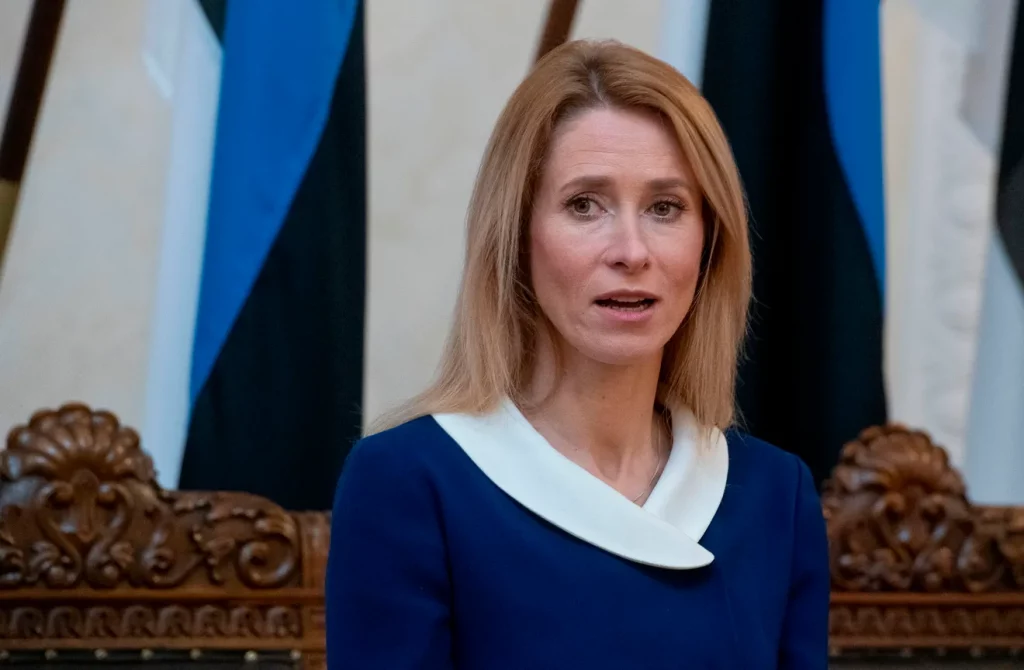
In his meetings with EU leaders, ‘the talking points are still the same,’ Kaja Kallas said in an interview with POLITICO.
EU leaders have stuck to a united script with Vladimir Putin, frustrating the Russian president’s attempts to sow division, Estonian Prime Minister Kaja Kallas told POLITICO on Thursday.
In the last two weeks, both French President Emmanuel Macron and German Chancellor Olaf Scholz have met with Putin in Moscow in an effort to defuse tensions over Russia’s massive military build-up along Ukraine’s border.
In each case, Kallas said, “we were consulted before those meetings took place and after.”
And according to “different sources,” Kallas added, Russia was “negatively surprised because, even if they are having separate meetings, even behind closed doors, the talking points are still the same.”
The Estonian leader was speaking after an informal meeting of EU leaders to discuss their approach to Russia and which sanctions the bloc would adopt if Moscow invades. Leaders were gathering before the start of an EU summit with African Union leaders.
Kallas praised the coordination between European countries amid the flurry of diplomatic overtures to Moscow, saying Germany and France have offered EU allies “the possibility to emphasize issues and bring the view [on] how we see those things.”
She added: “I feel especially Macron is definitely listening to these issues and every leader who has gone to Moscow has kept the same line.”
The EU line has been to push dialogue with Moscow, while still flatly rejecting Putin’s demands that NATO allies pull back from Eastern Europe and guarantee Ukraine will never join the military alliance.
Kallas denied any suggestion that Scholz had deviated from that line during a recent trip through Kyiv when he tamped down talk of Ukraine joining NATO, saying “the question of [Ukrainian] membership in alliances is practically not on the agenda.”
“What everybody emphasized and also Chancellor Scholz emphasizes is that we are not backing from the open-door policy of NATO,” she said, meaning the right of any country to join the alliance. “We are not giving any concessions regarding this. And this is important.”
Before Thursday’s gathering of EU leaders, Kallas said she met with Scholz and he “emphasized that Germany is very committed also to our defense” — a pledge that comes amid criticism over Berlin’s refusal to send weapons to Ukraine.
Scholz’s reassurance, Kallas said, “is something that we consider important.”
Scholz and Macron also recounted their meetings with Putin for EU leaders during Thursday’s gathering in order to ensure all 27 countries were “equally in the picture.”
The meeting was also an occasion to discuss the sanctions package the EU is assembling in case Russia launches an assault on Ukraine. Kallas said the slate of punishments “is ready” and has been coordinated with the U.S., U.K., Switzerland and Canada.
Yet diplomats have consistently said the biggest challenge left is choosing when to trigger them. After damaging cyberattacks? If Putin recognizes the independence of contested regions in eastern Ukraine?
“We didn’t discuss that in much detail,” Kallas said. “That’s discussed at more technical levels.”
Quick sanctions in response to cyberattacks are difficult because digital assaults are complicated to attribute. On the other hand, if Putin recognized the independence of the contested regions, that would be a hard fact, easy to sanction.
“That is why he’s not doing it, he’s playing with this,” Kallas said.
